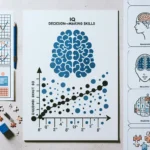Understanding the Relationship between IQ and Decision-Making Skills
Decision-making is an essential aspect of our daily lives, and it’s only natural to ponder whether our Intelligence Quotient (IQ) has any impact on our ability to make judicious choices. IQ is often regarded as an indicator of a person’s cognitive abilities, including logical reasoning, problem-solving, and understanding complex concepts. It’s a measure that has been widely used to predict educational attainment and job performance, but when it comes to decision-making, the connection is not as straightforward as one might think.
Firstly, it’s important to understand what IQ tests measure. They typically assess verbal comprehension, perceptual reasoning, working memory, and processing speed. High scores in these areas suggest strong cognitive abilities, but they don’t directly evaluate an individual’s competence in making decisions. Decision-making involves not only cognitive processes but also emotional regulation, risk assessment, and social understanding.
One critical aspect of solid decision-making skills is the ability to weigh the pros and cons, foresee the consequences of different actions, and select the most beneficial course. While a person with a high IQ may have effective analytical skills to evaluate complex information, this doesn’t necessarily translate into making the best decisions. Emotional intelligence (EQ), which involves recognizing and managing one’s own emotions and understanding others’, plays a crucial role in decision-making. An individual who has high EQ might be more adept at making choices that consider the emotional impact on themselves and others.
Moreover, contextual and environmental factors significantly influence our decision-making abilities. For example, individuals facing stress or time constraints might not make the same decisions they would under more relaxed conditions, regardless of their IQ level. Additionally, past experiences, values, beliefs, and cultural backgrounds all shape how a person makes decisions, pointing to a more nuanced interplay between intelligence and decision-making than can be determined by IQ alone.
Interestingly, some psychological research suggests that high-IQ individuals can be susceptible to cognitive biases just like anyone else – sometimes even more so because they may be overconfident in their intelligence and decision-making abilities. For instance, the overconfidence effect, where a person’s subjective confidence in their judgments is higher than their objective accuracy, is often observed among high-IQ individuals.
In conclusion, while IQ is a measure of certain cognitive abilities, it cannot be relied upon as the sole predictor of decision-making skills. Decision-making is a multifaceted process involving cognitive intelligence, emotional intelligence, situational factors, past experiences, and personal values. Thriving in this complex aspect of human behavior requires a broader understanding beyond simple IQ metrics. Therefore, individuals seeking to improve their decision-making skills should consider emotional intelligence development, stress management techniques, and deliberate practice in diverse scenarios to enhance their overall cognitive repertoire.
By appreciating the intricate relationship between IQ and decision-making skills, we can foster better understanding and encourage a more holistic approach to personal and professional development. As we continue to delve into the depths of human intelligence, it becomes clear that it’s not just the magnitude of one’s IQ that matters but the way in which we apply our mental faculties to the myriad of choices that life presents.

